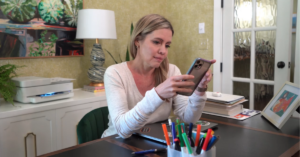When Penn and I were on The Amazing Race, they took away our phones, tablets, laptops… anything we could use to access the outside world or the internet. If we had a question, we couldn’t Google it to get the answer like we can now. We had to wonder.
On one particular day, we had some downtime and we were able to watch a movie in our hotel room. We saw Halle Berry in the opening credits, but she never appeared in the movie itself. Did she get cut? Did we miss her? Is there another actress named Halle Berry? Penn and I had no idea, so we just had to talk about it and speculate.
7 Weeks Screen-Free
Aside from not being in contact with our children, it felt good to be unplugged for so long while on The Amazing Race. Penn and I spent more time talking to pass the time and we got closer. I remember when we got back I told everyone I wasn’t going to be on my phone as much as a result. That lasted probably one week. Our phones are amazing pieces of technology, but is having so much at our fingertips good for us?
This week, we had Carlos Whittaker to answer this very question. Carlos recently wrote the book, Reconnected: How 7 Screen-Free Weeks with Monks and Amish Farmers Helped Me Recover the Lost Art of Being Human. As an experiment, he spent 7 weeks screen-free doing brain scans before and after. The results and learnings from his book were eye-opening.
Taking Steps To Change
“This book isn’t about why phones are bad,” Carlos explained on the show. “It’s about why it’s beautiful on the other side of the phone.” On one of the first days of the experiment while living with monks, Carlos went outside and it was unbearably hot. He reached for his phone to see what the temperature was. His phone wasn’t there. He realized he didn’t need to know the temperature, he could be ok with knowing it was just hot. How would knowing the number help?
The same thing happens with Penn and I using our GPS around town. Do we need it to know where we are going? Not always. Do we use it anyway? Yes. Turns out, overuse of GPS can lead to a decline in spatial awareness and can take over some of the functions of the hippocampus, which is the part of the brain that supports spatial memory, and mental mapping. It can also lead to more stress. (Sounds like I don’t need to plug in the address every time I go to the grocery store.)
What’s your relationship with your phone like? Tell us in the comments and play the episode for more tips (including how to turn off alerts.) Happy listening:
- Acast: https://open.acast.com/public/streams/618c3caaa322d1001350082c/episodes/671bdba4e2cfa0e3ae162d25.mp3
- Apple Podcasts: https://podcasts.apple.com/us/podcast/the-holderness-family-podcast/id1378725018?i=1000674830145
- Spotify: https://open.spotify.com/episode/2WS9uq0Dun3FvnH7wVsC4B?si=3698c9280fff48f4
- Pandora: https://pandora.app.link/Q7NBM9yv5Nb
- Amazon: https://music.amazon.com/podcasts/094464e9-aad9-4b09-8ee8-248c76b48bd6/episodes/8dd53947-5f3e-4139-bbb4-922ba04ec3a7/the-holderness-family-podcast-life-beyond-your-phone-with-carlos-whittaker




